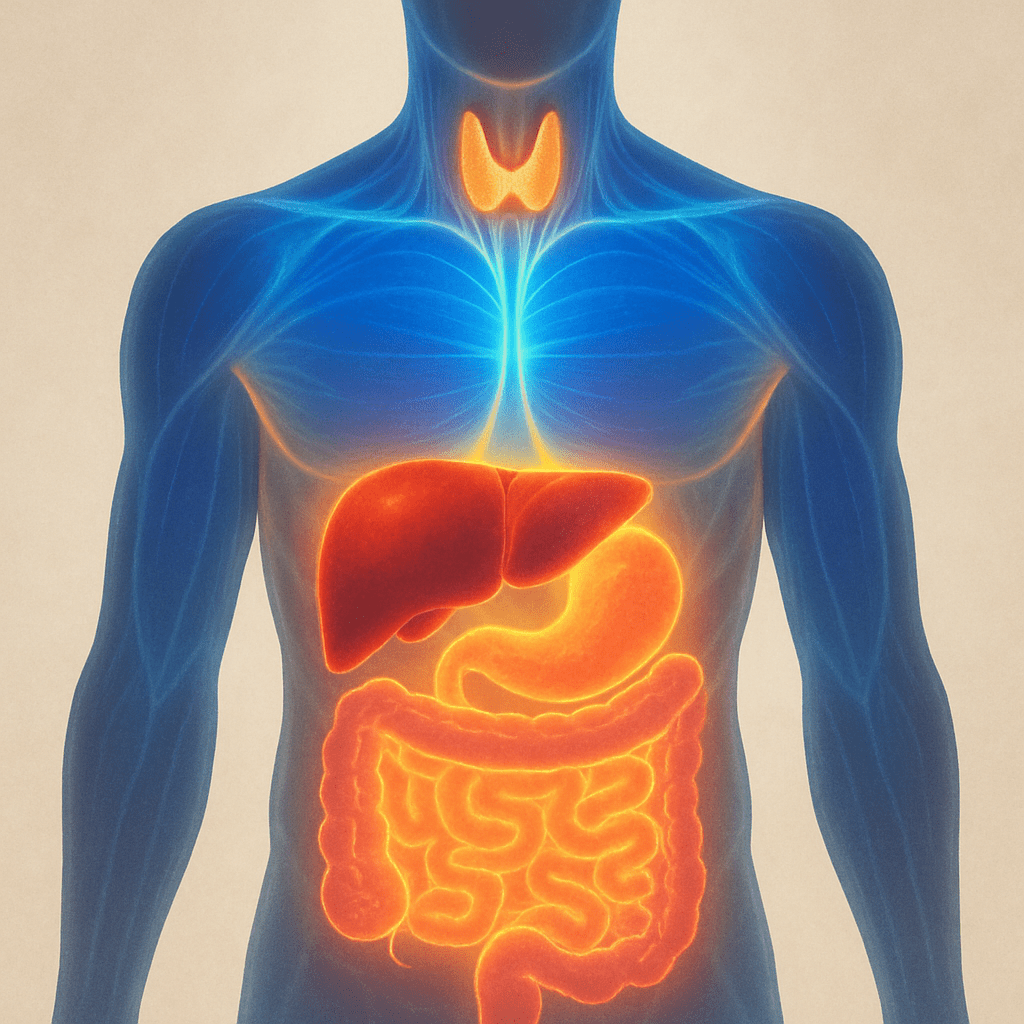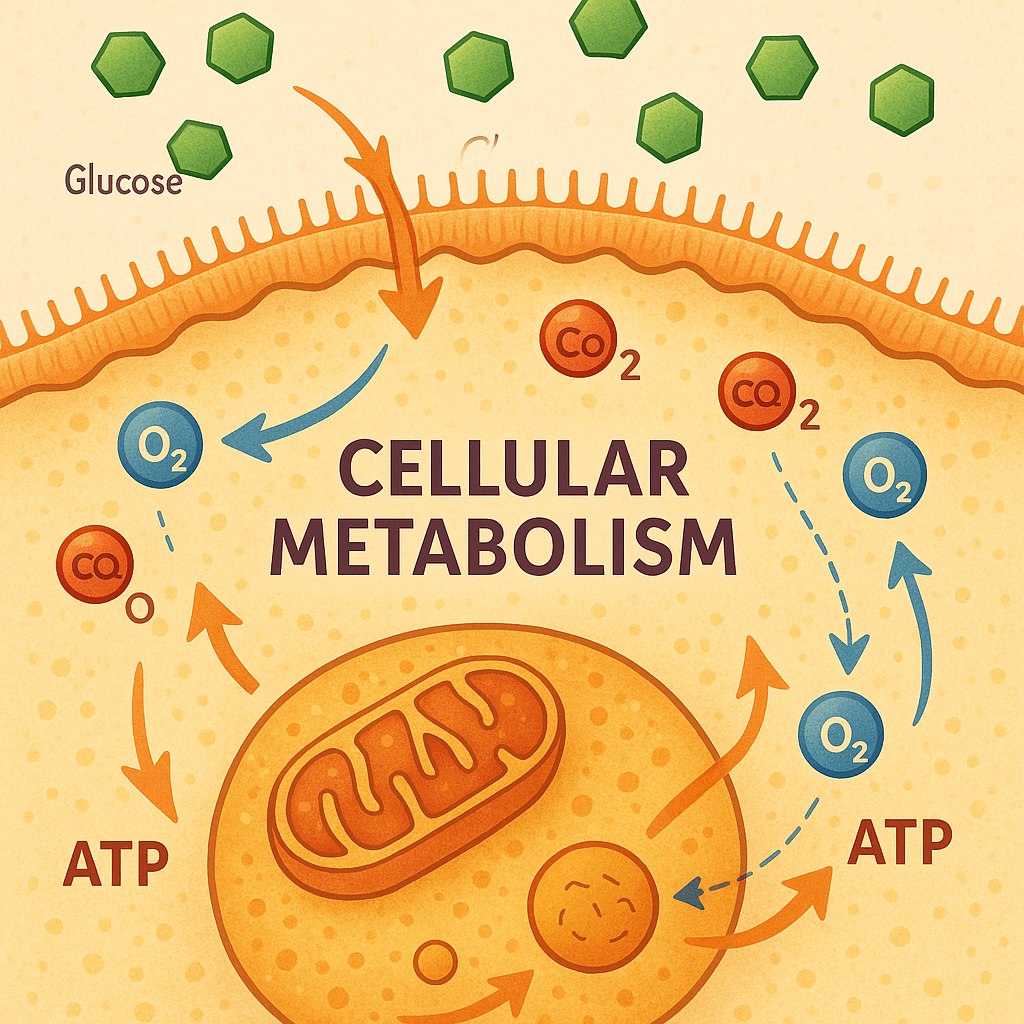Metabolism, or metabolism, is a set of complex biochemical processes that convert food into energy needed for the body to function. Not only body weight, but also general well-being, energy levels and immunity depend on its efficiency. A slowed metabolism is often associated with weight gain, fatigue and even mood swings. Our lifestyle, diet, age and genetic factors have a direct impact on the functioning of metabolism.
It is important to understand that digestion, nutrient absorption and metabolism are closely related processes. In order to maintain optimal metabolism, it is necessary to take care of the digestive system. Natural supplements for digestion, such as spirulina, probiotics or mummy, can help maintain intestinal health, which is the basis of metabolism.
In this article, you will learn what metabolism really is, what factors affect it, what mistakes to avoid, and what practical ways can help you improve it so you feel better and manage your weight more easily.
How metabolism works: the science of metabolism
Metabolism includes two main groups of processes: catabolism and anabolism. During catabolism, complex substances are broken down into simpler ones, releasing energy (for example, the breakdown of glucose into energy). Anabolism is the creation of new cells and the repair of tissues, which uses some of the released energy. Both of these processes occur continuously and form the metabolic cycle.
Metabolism is regulated by a complex system of organs and hormones. The main “engines” of metabolism are:

-
Thyroid gland – secretes hormones that control how quickly the body uses energy
-
Liver – performs over 500 biochemical functions, including processing fat
-
Muscle – uses more energy than other tissues, even at rest
-
Digestive system – breaks down food into nutrients and removes waste
According to researchers at the Lithuanian University of Health Sciences, basal metabolic rate (BMR) is the minimum amount of calories the body needs to maintain vital functions at rest. This amount accounts for about 60-75% of the total calories consumed per day and varies from person to person.
Basal metabolic rate depends on various factors, including body size and composition, age, gender, and genetics. For example, more muscle mass means a faster metabolism, as muscle burns more calories than fat tissue, even at rest.
Key Factors That Determine Metabolic Rate
Metabolic rate is influenced by a number of factors, some of which we can control and some of which are beyond our control. Understanding these factors can help you better manage your metabolism and overall health.
- Genetics – can cause as much as 25-30% differences in metabolic rate between people
- Age – after 30 years of age, metabolism begins to slow down by about 2-5% per decade
- Gender – men generally have a faster metabolism due to greater muscle mass
- Muscle mass – greater muscle mass increases basal metabolic rate
- Hormonal balance – especially thyroid, insulin and leptin
- Nutrition – food quantity and quality, meal frequency
- Physical activity – both aerobic and strength training
- Sleep quality – lack of sleep disrupts hormones important for metabolism
- Stress – long-term stress unbalances the hormonal system
According to physiologists, with age, metabolism slows down not only due to a decrease in muscle mass, but also due to a decrease in the activity of cell mitochondria – the energy factories. Therefore, it is especially important for older people to maintain muscle mass and mitochondrial health.
Hormones and metabolism: thyroid, insulin, and more
Hormones act as a chemical signaling network that coordinates metabolic processes. Thyroid hormones (T3 and T4) regulate how quickly cells convert food into energy. An underactive thyroid (hypothyroidism) slows metabolism and can cause weight gain, fatigue, and sensitivity to cold.
Insulin, produced by the pancreas, controls the entry of glucose into cells, where it is converted into energy. Insulin resistance (when cells become less sensitive to insulin) is a major risk factor for type 2 diabetes and can prevent the efficient metabolism of carbohydrates.
Leptin, known as the satiety hormone, signals the brain that the body has enough energy. Leptin resistance, often associated with obesity, can disrupt hunger and energy balance.
Excess cortisol (a stress hormone) over the long term can increase appetite, promote the accumulation of fat in the abdominal area, and reduce muscle mass, thus negatively affecting metabolism.
If you experience persistent fatigue, unexplained weight gain or loss, or increased sensitivity to temperature changes, these may be signs of a hormonal imbalance. In such cases, it is worth consulting with your doctor and considering additional metabolic support. Weight management supplements, such as berberine or fisetin, can help regulate metabolism and normalize hormonal activity.
Common Metabolic Mistakes: Habits That Slow Down Metabolism
Often without realizing it, our daily behavior contributes to slowing down our metabolism. Here are the main mistakes that slow down metabolism:
Diet and activity mistakes to avoid
Continuous calorie restriction. Long-term strict dieting can slow down metabolism. The body adapts to a lower calorie intake and begins to save energy by reducing the metabolic rate. Physiologists call this phenomenon “adaptive thermogenesis” – a protective mechanism that helps to survive famine.
Not enough protein. Protein activates the thermic effect process, during which the body uses more energy for digestion than for processing carbohydrates or fats. In addition, protein is necessary for maintaining muscle tissue, which in turn promotes faster metabolism.
Sedentary lifestyle. Long periods of sitting without breaks reduce muscle activity and insulin sensitivity. Studies show that even short breaks in activity every hour can boost your metabolism by up to 13%.
Ignoring poor sleep quality. Insufficient sleep (less than 7 hours) disrupts the balance of leptin and ghrelin, hormones that regulate appetite, which increases hunger and reduces energy expenditure. In addition, lack of sleep reduces the production of growth hormone, which is important for muscle recovery.
Excessive sugar consumption. Sugary drinks and foods with added sugar cause a sharp spike in insulin, which promotes fat storage and metabolic disorders. One study showed that drinking a sugary drink every day increases the risk of metabolic syndrome by 20%.
Avoiding strength training. Many people focus only on cardio training when trying to lose weight, ignoring strength training. However, increasing muscle mass is one of the most effective ways to improve long-term metabolism, since muscle burns more calories than fat even at rest.
Irregular eating habits. Going too long between meals can slow down your metabolism and encourage your body to store fat. Eating regular, balanced meals (including snacks) can help keep your metabolism steady.
Not drinking enough water. Dehydration can reduce your metabolic rate by up to 3%. Studies show that drinking 500 ml of water can temporarily increase your metabolic rate by 10-30%.
Foods, supplements and natural ways to speed up your metabolism
Scientific studies have shown that certain foods and natural ingredients can positively affect your metabolic rate. Here are some of the most effective:
Protein-rich foods. The body uses 20-30% of the calories from protein just to digest it, compared to 5-10% for carbohydrates and 0-3% for fats. The best sources of protein are lean meats, fish, eggs, legumes and dairy products.
Spicy foods. Capsaicin, found in hot peppers, temporarily speeds up metabolism and increases fat burning. Studies show that regular consumption of spicy foods can increase calorie consumption by up to 50 kcal per day.
Omega-3 fatty acids. Fatty fish (salmon, mackerel), flaxseed and walnuts have anti-inflammatory effects and improve insulin sensitivity, which has a positive effect on metabolism. Omega-3 fatty acids also help regulate the activity of leptin, the satiety hormone.
Green tea. The catechins and caffeine it contains increase thermogenesis and fat oxidation. Studies show that regular consumption of green tea can increase energy expenditure by up to 4-5%.
Turmeric. The curcumin it contains has anti-inflammatory properties and can help reduce fat storage. Curcumin activates a gene associated with fat burning processes.
Milk thistle. This herb helps the liver process fats more efficiently and eliminate toxins. The liver is a major organ of metabolism, so its health directly affects metabolism.
Probiotics and prebiotics. The gut microbiome plays an important role in metabolism. Studies show that certain strains of probiotics (such as Lactobacillus gasseri) can help reduce belly fat. The best sources are fermented foods (fermented milk, sour milk, kimchi).

Fiber-rich foods. Fiber not only keeps you feeling full longer, but it also requires more energy to digest. In addition, it feeds beneficial gut bacteria that produce short-chain fatty acids that have a positive effect on metabolism.
When it comes to supplements, it’s worth considering natural species like chlorella, which boosts the immune system, reduces inflammation, and provides antioxidant protection – all of which indirectly have a positive effect on metabolism.
Spirulina, a blue-green algae rich in protein and antioxidants, can also be a great daily supplement to support gut health and metabolic balance. It has a unique nutrient composition that contributes to improving the overall metabolism of the body.
How to prevent metabolism from slowing down with age
Although age is an inevitable factor that affects metabolism, we can take proactive measures to slow down this process and maintain good metabolism in old age.
Maintaining muscle mass. After the age of 30, people lose an average of 3-8% of their muscle mass per decade. Strength training 2-3 times a week can not only stop this process, but also increase muscle mass at any age. Studies show that even 90-year-olds can increase muscle strength and mass with proper training.
Increase protein intake. Older people are recommended to consume more protein than younger people – about 1.2-1.5 g/kg of body weight per day (compared to 0.8 g/kg for younger people). This helps preserve muscle mass and supports metabolism.
High-intensity interval training (HIIT). These short but intense workouts are especially effective at boosting metabolism in older age. They cause a “post-calorie effect” – increased calorie burning for up to 24 hours after training.
Monitoring thyroid health. The risk of thyroid disorders increases with age. Regular health check-ups and TSH (thyroid stimulating hormone) tests can help identify problems in time and prevent metabolic slowdown.
The importance of antioxidants. Oxidative stress contributes to the aging of mitochondria (cell energy factories). Antioxidant-rich foods – berries, dark green leafy vegetables, nuts – help protect mitochondria and maintain their efficiency.
Prioritizing sleep quality. Sleep becomes even more important in old age, when growth hormone production naturally decreases. High-quality, uninterrupted 7-8 hours of sleep helps maintain optimal hormone balance.
Stress management. Long-term stress increases cortisol levels, which promotes muscle loss and the accumulation of belly fat. Meditation, yoga practice or just regular walks in nature can reduce the impact of stress on metabolism.
Sufficient amount of B vitamins. These vitamins are involved in energy production processes at the cellular level. It is especially important to ensure adequate levels of vitamin B12, the absorption of which often decreases with age.
Doctors and nutritionists emphasize that early attention to maintaining metabolism can have a significant impact on quality of life in later life. Maintaining a healthy metabolism is not only about weight control, but also about protection against many age-related diseases, including diabetes, cardiovascular disease, and neurodegenerative conditions.
Summary
Metabolism is a complex network of biochemical processes that govern our energy, health, and body composition. While genetics and age play a role, our daily choices have a huge impact on metabolic efficiency.
The foundation of a healthy metabolism is a balanced diet with sufficient protein, regular physical activity (especially strength training), quality sleep, and stress management. These key elements can be supplemented with metabolism-boosting foods and, if necessary, natural supplements.
It is very important to remember that sudden, drastic methods rarely produce long-term results. The best results are achieved by consistently changing your lifestyle and forming healthy habits. Consistency, not perfection, is the key to success.
If you suspect that your metabolism is slowed due to hormonal imbalances or other medical reasons, it is always worth consulting a healthcare professional. An individualized approach based on your unique needs and health status is the most effective path to optimal metabolism and overall well-being.
Frequently Asked Questions (FAQs)
What is metabolism and why is it important?
Metabolism is the set of chemical processes that convert food into energy and building blocks for cells. It directly affects weight, energy levels, and overall health.
What slows down metabolism the most?
The main causes are reduced muscle mass, strict diets, hormonal imbalances (especially thyroid), a sedentary lifestyle, and poor sleep.
What foods or supplements naturally boost metabolism?
Protein-rich foods, spicy (capsaicin-containing) ingredients, green tea, fiber-rich foods, and certain supplements like curcumin and spirulina help support a healthy metabolism.
Can age-related metabolic slowdown be reversed?
While metabolism naturally slows with age, regular exercise, a balanced diet, stress management, and certain supplements can significantly slow down this slowdown.
How do I know if I have a metabolic disorder?
Symptoms may include unexplained weight gain or loss, persistent fatigue, difficulty maintaining a stable weight, or other health changes. It is recommended that you see a doctor for a thorough evaluation.

